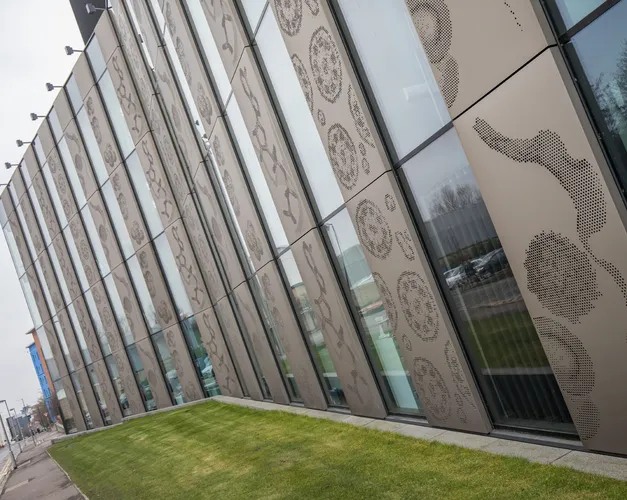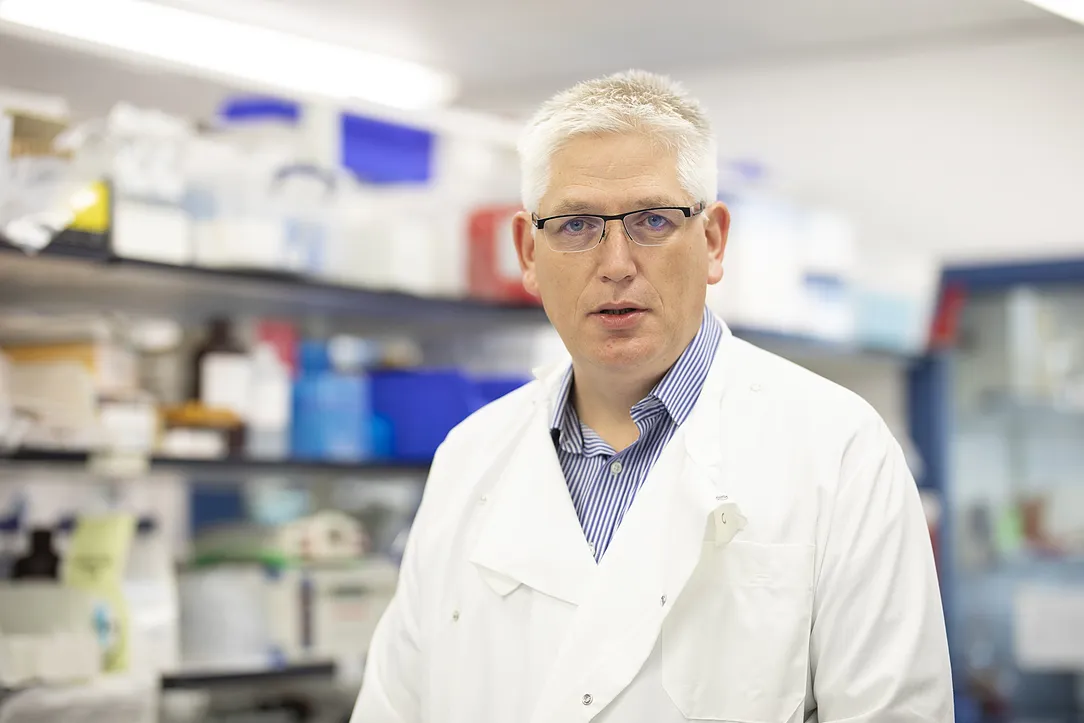Feature
Division of Signal Transduction Therapy
The University of Dundee’s Division of Signal Transduction Therapy (DSTT) is one of the world’s most significant collaborations between the commercial pharmaceutical industry and any academic research institute
Published on 28 May 2020

A unique collaboration involving the MRC PPU, other leading researchers in Dundee’s School of Life Sciences, and a number of the world’s leading pharmaceutical companies. Established in 1998 this long-standing collaboration has attracted almost £60 million of investment, helped develop dozens of drugs for clinical use and is widely regarded as a model for how academia should interact with industry, for which it was awarded the prestigious Queen’s Anniversary Prize for Higher Education in 2006.
Pfizer
Background
The DSTT was founded in 1998, expanded in 2003 and renewed in 2008 and 2012, and is the world’s longest running collaboration between academic research laboratories in Dundee and the pharmaceutical industry.
A 2016 funding renewal saw pharmaceutical giants Boehringer Ingelheim, GlaxoSmithKline and Merck Serono provide £7.2 million of support until 2020, enabling scientists at Dundee to continue their fundamental research in multiple therapeutic areas, including cancer, arthritis, lupus, hypertension and Parkinson’s disease. The consortium has now attracted £58 million of investment since its inception and has also involved AstraZeneca, Janssen Pharmaceutica NV and Pfizer in previous years.
It is widely regarded as a model for how academia and industry can interact productively for which it was awarded a Queen’s Anniversary Prize for Higher Education in 2006. The DSTT works with the participating companies to identify novel drug targets and develop enabling technologies that have accelerated the development of improved drugs to treat global diseases that target enzymes termed 'kinases' and the ubiquitin system within the body.
The collaboration was founded by Professor Sir Philip Cohen and Professor Sir Pete Downes, exPrincipal and Vice-Chancellor of the University. It comprises 22 research teams at the School of Life Sciences, 12 of which are based within the Medical Research Council Protein Phosphorylation and Ubiquitylation Unit (MRC-PPU). Professor Dario Alessi took over as Director of DSTT in 2012. Dundee’s School of Life Sciences is the world’s largest centre for the study of kinases and the ubiquitin system with some 200 scientific and support staff working in this area.
Sir Philip Cohen
Challenge
The aim is to develop improved treatments in multiple therapeutic areas, including cancer, arthritis, lupus, hypertension and Parkinson’s disease by accelerating the early stage development of future drugs that target specific cell signalling systems, namely phosphorylation and ubiquitylation.
Solution
The main benefit to the pharmaceutical companies is close interaction with the scientific groups and other partner companies, and the advice, opinions and foresight of leading academics such as Professor Sir Philip Cohen, Professor Dario Alessi and Professor Doreen Cantrell.
The DSTT does not conduct contract research on behalf of member companies. However, in the current DSTT, the companies not only get access to the ongoing fundamental research projects designed by Dundee scientists but also have the opportunity to co-design projects within the academic laboratories.

Professor Dario Alessi, Director MRC-PPU
The companies visit Dundee twice a year for a three-day meeting that includes the all-important face-to-face meetings with the academic scientists and a full day of scientific presentations. The closed/confidential nature of the scientific showcase meeting ensures that all the companies get access to cutting edge, late breaking results to seed future collaborative projects. The science day includes a guest talk to showcase other areas of expertise at Dundee.
In addition to the funding that maintains the science base within the University the DSTT collaboration provides the students and postdocs an opportunity to gain vital experience of working closely with pharmaceutical companies and building key contacts. This stimulates some to embark on a career in pharmaceutical drug discovery.
To facilitate the transfer and management of Intellectual Property, a structure is in place which includes option agreements, upfront licences and standard licence terms. The University’s department of Research and Innovation Services (RIS) provides business management and support for the DSTT and facilitates new relationships which the companies may wish to form when extending their relationship with Dundee.
GlaxoSmithKline
Outcomes
-
Thought to be one of the world's largest and longest running collaborations between the pharmaceutical industry and any academic research institute and has been operational for over 20 years.
-
Widely regarded as a model for how academia and industry can interact productively for which it was awarded a Queen’s Anniversary Prize for Higher Education in 2006
-
Has led to the development and clinical approval of over 40 drugs that target kinases, mainly for the treatment of cancers to date, with sales of many billions of pounds a year.
-
Dundee research staff within the DSTT played a significant role in aiding GlaxoSmithKline develop a new anti-cancer drug, Dabrafenib (Tafinlar), targeting melanoma.
-
Has given our students and post docs unique insights into how the pharmaceutical industry works, which has had a profound influence on their subsequent careers.
-
The research of the Dundee academics involved in the collaboration has identified novel drug targets and developed enabling methodologies that have helped to launch and accelerate dozens of new drug discovery programmes within the participating pharmaceutical companies.
-
The collaboration helped attract two biotechnology companies to Dundee.
-
The £58 million of funding has secured many new research posts and helped to maintain the vibrancy and productivity of one the world’s largest academic research centres for the study of kinases and the ubiquitin system, with some 200 scientific and support staff working in this area.
-
DSTT is an early example of open innovation, where partners work together sharing risks, costs and outputs rather than competing, although the model also provides for one-to-one interaction between a partner company and the University on a confidential basis.
-
The consortium was recognised by the Department of Trade and Industry as a model of best practice in technology transfer and has directly injected well over £23 million directly into the local economy.
Dr Malcolm Skingle, Director of Academic Liaison at GlaxoSmithKline
Press Office, University of Dundee
[email protected]